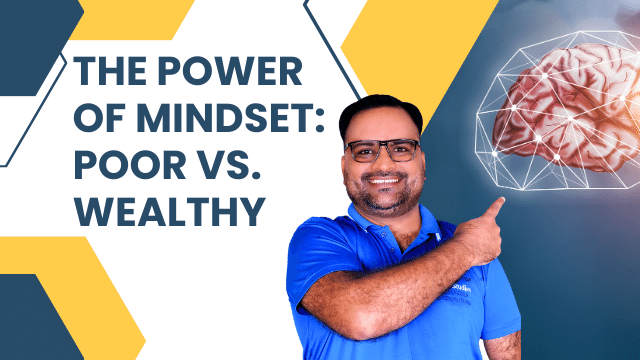The Power of Mindset: Poor vs. Wealthy: In the pursuit of financial success and well-being, one of the most critical factors often overlooked is the power of mindset. Your mindset shapes your approach to needs, wants, savings, and investments, ultimately determining your financial journey. In this blog, we will explore the key differences between a poor mindset and a wealthy mindset when it comes to addressing needs, wants, savings, and investments. By understanding these distinctions, you can begin to adopt a mindset that leads to a brighter financial future.
The Power of Mindset: Poor vs. Wealthy

Poor Mindset:
1. Needs: In a poor mindset, individuals tend to focus solely on their immediate needs. They prioritize necessities like food, shelter, and basic utilities. While addressing these needs is essential, the poor mindset often neglects the bigger picture, lacking a strategic plan to overcome financial challenges in the long run.
2. Wants: Poor mindsets frequently blur the line between needs and wants. People may overspend on non-essential items, succumbing to impulsive purchases and consumer debt. This further compounds financial difficulties, making it challenging to break the cycle of living paycheck to paycheck.
3. Savings: Savings are often minimal or nonexistent in a poor mindset. Any extra income is quickly spent on wants, and there’s little thought given to building a financial safety net for emergencies or future goals. This lack of savings can result in increased financial stress and vulnerability.
Wealthy Mindset:
1. Needs: A wealthy mindset distinguishes between needs and wants clearly. Basic necessities are covered, but the focus extends beyond immediate survival. A wealthy mindset aims for financial stability and abundance, seeking to ensure that needs are consistently met in the long term.
2. Investments: Investments are a fundamental aspect of the wealthy mindset. Rather than squandering resources on impulse purchases, individuals with a wealthy mindset channel their money into income-generating assets like stocks, real estate, or businesses. These investments create a pathway to financial growth and security.
3. Wants: In a wealthy mindset, wants are still acknowledged and satisfied, but with a difference. They are not indulged in haphazardly; rather, they are budgeted for and earned through disciplined financial planning. This approach allows individuals to enjoy a comfortable lifestyle without compromising their long-term financial goals.
Conclusion
It’s evident that the key to financial success lies in adopting the right mindset. Shifting from a poor mindset, where immediate needs and unchecked wants take precedence, to a wealthy mindset, where needs are secured, investments are made, and wants are managed responsibly, can transform your financial trajectory. It’s about striking a balance between satisfying your desires and securing your future.
Ultimately, the choice is yours. Are you willing to adopt the mindset that paves the way for financial prosperity, or will you continue down the path of financial instability? Remember that wealth is not solely about what you have but how you think about what you have. Make the conscious choice to cultivate a wealthy mindset, and watch your financial well-being flourish
Attend the Free – Digital Success Webinar – It is Worth Rs. 5,999
Read More on Motivation













